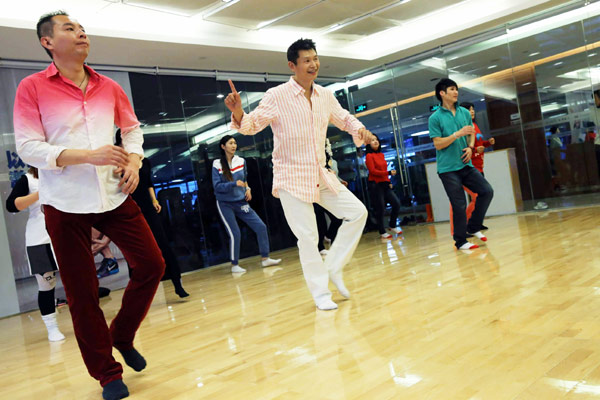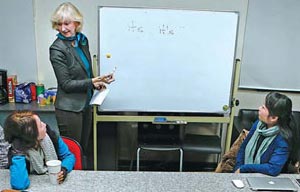Fiery and footloose
Updated: 2012-12-12 10:37
By Gan Tian (China Daily)
|
|||||||||||
 |
|
Huo Yaofei (center) teaches at a salsa dancing class at Beijing's Power House Gym. Jiang Dong / China Daily |
Most of his graduating class earned 3,000 yuan ($480) a month in 2000, while he was raking in 20,000 yuan.
In 2003, CCTV-5 - the State television broadcaster's sports channel - started a TV program in which Huo taught basic salsa steps.
But Huo lost his footing when SARS shut down all dance classes in Beijing that year.
He had no income and began re-thinking his career path.
A friend who worked at the Cuban embassy in the capital told him: "You must go to Cuba - salsa's birthplace."
So, Huo did.
|
 |
Recommendation: |
"I wasn't the least bit disappointed," he says.
He majored in Latin music and folk dancing at Cuba's Instituto Superior de Artes for three years.
"Actually, I didn't learn anything about salsa at the school because everyone there already knew it naturally so they didn't teach it," Huo recalls.
"But I spent that time traveling to nearly every city in Cuba and observed every detail of their dancing and lifestyles."
He beat professional dancers from 40 countries to win the gold medal at the International Festival of Popular Dance, in Havana, Cuba, in 2005.
"A lot of foreigners know how to salsa," he explains.
"But many Cubans say they do it 'no tenen sabor', or, 'without feeling'."
Related: Salsa adds spice to Suzhou dance scene
Huo says he knew he'd won right after his performance - a premonition that came from the gut intuition he honed in Cuba.
"Most foreign salsa students, especially Chinese, are fascinated by the skills," he says.
"They're obsessed with the idea of how many spins and jumps they can pull off. But I found it was totally different in Havana. People danced with joy in their hearts. They love dancing and are optimistic about life."
Huo has adopted this optimism.
The Chinese dancer, who's fluent in Spanish, frequently travels to Cuba to improve his moves through learning how to enjoy life rather than through studying techniques.
"Salsa dancers must have a relaxed and open approach to life," he says.
Contact the writer at gantian@chinadaily.com.cn.
Related Stories
Salsa dance with 'Our Folks' 2012-05-18 09:09
Belly dance becomes popular among Chinese young people 2012-12-05 14:10
Actors of Miao ethnic group perform dance 2012-11-30 15:49
Dancers perform tourism dance 'Tengchong Dream' in China's Yunnan 2012-11-08 15:03
Yang Liping's dance drama 'The Peacock' staged in Qingdao 2012-11-08 14:27
Today's Top News
Rescuers race against time for quake victims
Telecom workers restore links
Coal mine blast kills 18 in Jilin
Intl scholarship puts China on the map
More bird flu patients discharged
Gold loses sheen, but still a safe bet
US 'turns blind eye to human rights'
Telecom workers restore links
Hot Topics
Lunar probe , China growth forecasts, Emission rules get tougher, China seen through 'colored lens', International board,
Editor's Picks

|

|

|

|

|

|





